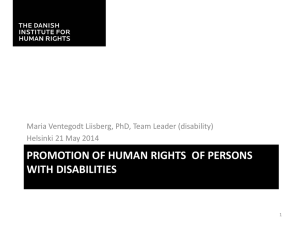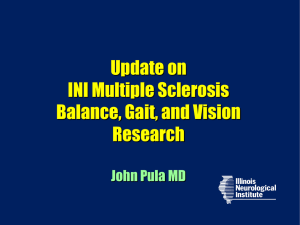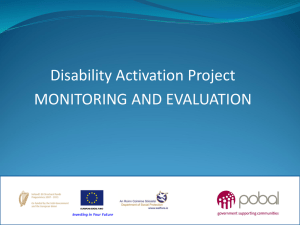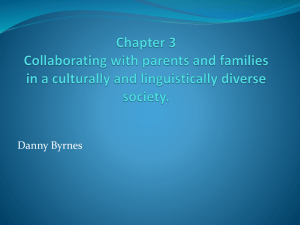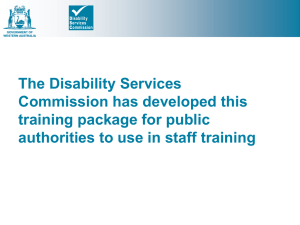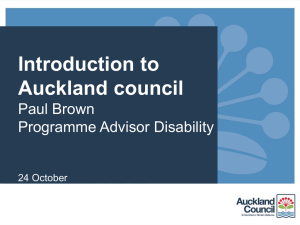Disability Justice Centres
advertisement
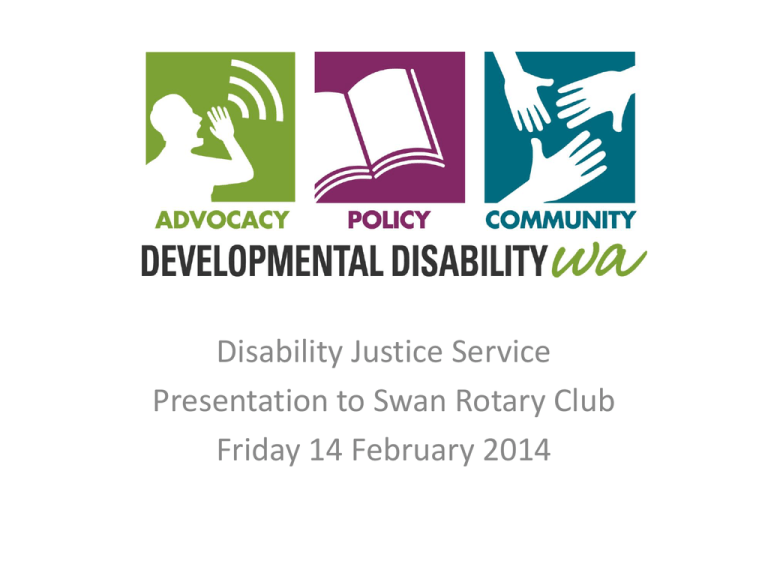
Disability Justice Service Presentation to Swan Rotary Club Friday 14 February 2014 Who is Developmental Disability WA • Non-government, not-for-profit organisation • Over 25 years as peak advocacy voice for people with developmental disability, their families and the organisations that support them • Developmental disability - a disability a person is born with or which occurs during their developmental years Who is Developmental Disability WA • Developmental Disability WA creates lasting positive change by: – Supporting people with developmental disabilities and their families to have a strong voice – Influencing government and other decision makers – Partnering with others to develop more connected and inclusive communities Overview • Intellectual disability and the criminal justice system • Mental Impaired Accused Act – why the disability justice centres • Key features of the centres • Benefits of this approach Intellectual disability and the criminal justice system • People with intellectual or cognitive disability are over-represented in criminal justice system • Their disability is not the cause of their offending – literacy, homelessness, co-morbid psychiatric illness, unemployment, lack of family and social supports • Failure to respond to these factors increases risk of recidivism MIA – Why the disability justice centres? • Mental Impaired Accused – unable to understand the nature of the charge; – unable to understand the requirement to plead to the charge or the effect of a plea; – unable to understand the purpose of a trial; – unable to understand or exercise the right to challenge jurors; – unable to follow the course of the trial; – unable to understand the substantial effect of evidence presented by the prosecution in the trial; or – unable to properly defend the charge. MIA – Why the disability justice centres? • WA Law Reform Commission (1991) • Reed report (1992) • Criminal Law (Mental Impaired Accused) Act 1996 authorises MIA Review Board to determine conditions – Unconditional release – Detention in an authorised hospital – Detention in a declared place – Detention in a prison MIA – Why the disability justice centres? • Disability justice centres – the missing link in a treatment pathway for people with intellectual and cognitive disability • Provides an option in between prison and non-conditional release – Services and supports that address individual factors contributing to offending in a safe environment and the opportunity for supported transitions that reduce future offending and therefore lead to better outcomes MIA – Why the disability justice centres? • MIA persons must demonstrate that they are unlikely to reoffend • Fitness to return to the community is assessed by MIA Review Board • People must demonstrate appropriate behaviours in community based settings – they can only learn and demonstrate these if they are able to spend times in community based settings Disability justice centres – key features • Who will be placed in the centres – Found by court to be mental impaired accused – Must be 16 years or over – Mental impairment must be due to intellectual or cognitive disability – MIA Review Board will determine whether a mental impaired accused person can live at a centre (Disability Justice Centres: Safeguarding the community) Benefits of this approach • Community-based settings ‘best practice’ in the successful and effective support for people with intellectual and cognitive disability who have offended • Model prioritises community safety and proactively manages potential risk to residents and to community


